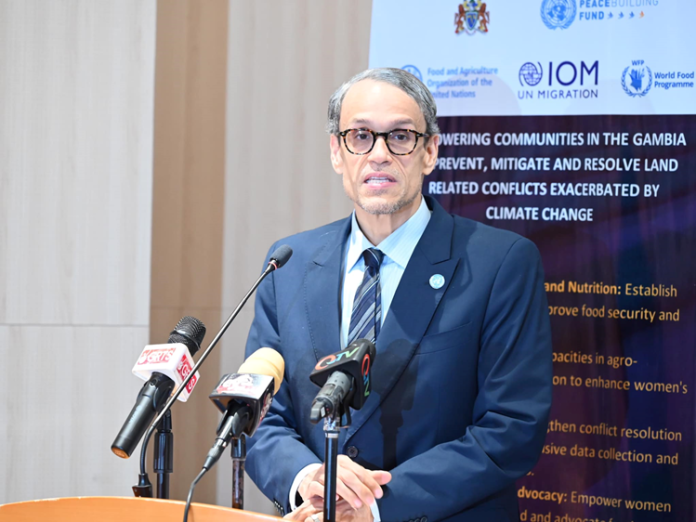By Momodou Jarju
The United Nations (UN) Resident Coordinator for The Gambia, Mr. Karl Frédérick Paul, while deliberating on a UN joint project aimed at addressing land-related conflict worsened by climate change, has said that empowering Gambian communities will foster lasting peace.
Launched last Thursday and funded by the United Nations Peacebuilding Fund (PBF), the $3 million dollar project will be jointly implemented by the Food and Agricultural Organization (FAO), World Food Programme (WFP), and the International Organization for Migration (IOM).
Titled “Empowering Communities in The Gambia to Prevent, Mitigate and Resolve Land-Related Conflicts Exacerbated by Climate Change”, Mr Paul said the project represents their collective commitment to transform these challenges into pathways for peace and sustainable development.
“By empowering communities, we are not just addressing conflict, we are building resilience, fostering sustainable livelihood and paving the way for lasting peace. This initiative embodies the spirit of the Sustainable Development Goals as it is integrated, inclusive and transformative,” he said.
“It recognises that peace, development and environmental sustainability are extremely and inexplicably linked. By addressing land-related conflict through the lens of climate change, we are tackling the Sustainable Development Goal No. 13 on climate action, the SDG 16 on peace, justice and strong institutions, and of course the SDG No. 1 that addresses no poverty amongst others.”
Mr Paul said the climate crisis is not a distant threat, but a present reality in the Gambia and across the globe, saying people have seen recently in different parts of the world the erratic climate patterns in the different regions.
“Rising sea levels are threatening our coastal region, while changing precipitation patterns affect our agriculture-dependent communities. These shifts are not only ecological patterns or challenges, they are also catalysts for social tension, particularly around land use and land ownership,” he said.
The UN Resident Coordinator further said the success of the initiative depends on the engagement of all stakeholders, including The Gambia Government. He urged the stakeholders to ensure the insights gained from this project inform national policies on land use, climate adaptation and conflict resolution.
“We urge you to allocate the necessary resources to scale up successful intervention. To the civil society organizations that are present here or listening to us, your deep-rooted communities are invaluable and necessary as well. We need you to facilitate community dialogue, monitor project impact and hold all of us accountable to our commitments,” he said.
“To the communities themselves that we proudly and humbly serve, you are the heart and the success of this project. Your active participation is needed in designing and implementing the solutions. Your indigenous and very crucial knowledge is important for developing sustainable, locally owned strategies.”
Paul noted that they are not just addressing an immediate challenge, but they are investing in the future of the Gambia—a future where communities are empowered to manage their resources sustainably, resolve conflict peacefully, and thrive in the face of climate challenges.
“I urge all of us to approach this work with urgency, creativity and unwavering commitment to leaving no one behind. The challenges we face are very complex, but great is our collective strength when we work together. Let us move forward with determination, knowing that every step we take brings us closer to a more resilient, prosperous and peaceful Gambia,” he said.
Meanwhile, 10 communities in Lower River Region (LRR), North Bank Region (NBR), and Central River Region (CRR) will be empowered by this project. And the project will last for 36 months.


















